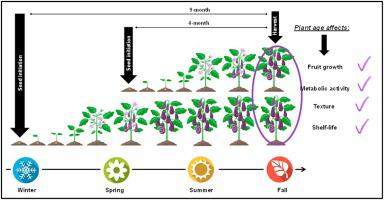当前位置:
X-MOL 学术
›
Sci. Hortic.
›
论文详情
Our official English website, www.x-mol.net, welcomes your feedback! (Note: you will need to create a separate account there.)
The plant age influences eggplant fruit growth, metabolic activity, texture and shelf-life
Scientia Horticulturae ( IF 4.3 ) Pub Date : 2020-10-01 , DOI: 10.1016/j.scienta.2020.109590 Lucía Valerga , Magalí Darré , María José Zaro , Ariel Roberto Vicente , María Laura Lemoine , Analía Concellón
Scientia Horticulturae ( IF 4.3 ) Pub Date : 2020-10-01 , DOI: 10.1016/j.scienta.2020.109590 Lucía Valerga , Magalí Darré , María José Zaro , Ariel Roberto Vicente , María Laura Lemoine , Analía Concellón

|
Abstract Vegetable quality shows extensive variation along a single production cycle depending on the harvest season. So far, these effects have been mostly attributed to variations in preharvest climatic conditions, resource availability and cultural practices. Whether or not some of these differences are also influenced by variations in the plant age is unknown. The aim of this work was to evaluate if the plant age modulates eggplant fruit composition at harvest and postharvest performance. Eggplants were synchronically produced in plants having different age (4-or 9-month old). At the same dates fruit was picked and assessed for quality at three developmental stages: Baby (9 cm long), Small-Commercially Mature (Small-CM, 17 cm long) and Large-Commercially Mature (Large-CM, 19 cm long). Eggplants from 4-and 9-month old plants harvested at Small-CM, were stored at 10 °C for 0, 7, 14 and 21 d and evaluated for postharvest performance. Eggplants picked in 4-month plants grew faster, reaching commercial maturity earlier than those developing in older plants. In addition, fruit growing in 4-month plants were softer and had higher respiration rate and sugar content. Instead, the plant age did not affect seed number, size or fruit antioxidant content. Finally, fruit from 4-month plants were less susceptible to postharvest dehydration and softening and stored better. Taken together results show that the plant age significantly affects eggplant fruit growth, metabolic activity, texture and shelf-life.
中文翻译:

植物年龄影响茄子果实的生长、代谢活动、质地和保质期
摘要 蔬菜质量在一个单一的生产周期中表现出广泛的变化,这取决于收获季节。到目前为止,这些影响主要归因于收获前气候条件、资源可用性和文化习俗的变化。这些差异中的一些是否也受到植物年龄变化的影响尚不清楚。这项工作的目的是评估植物年龄是否会调节收获时和收获后性能的茄子果实组成。茄子在不同年龄(4-或9个月大)的植物中同步生产。在同一天采摘水果并评估三个发育阶段的质量:婴儿(9 厘米长)、小型成熟期(小 CM,17 厘米长)和大型成熟期(大 CM,19 厘米长) . 在 Small-CM 收获的 4 个月和 9 个月大的茄子在 10°C 下储存 0、7、14 和 21 天,并评估收获后的性能。在 4 个月植物中采摘的茄子生长得更快,比老植物中发育的茄子更早达到商业成熟。此外,生长在 4 个月植物中的果实更柔软,呼吸速率和糖含量更高。相反,植物年龄不影响种子数量、大小或果实抗氧化剂含量。最后,来自 4 个月植物的果实不太容易受到采后脱水和软化的影响,并且储存得更好。综合结果表明,植物年龄显着影响茄子果实的生长、代谢活动、质地和保质期。比在老植物中发育的那些更早达到商业成熟。此外,生长在 4 个月植物中的果实更柔软,呼吸速率和糖含量更高。相反,植物年龄不影响种子数量、大小或果实抗氧化剂含量。最后,来自 4 个月植物的果实不太容易受到采后脱水和软化的影响,并且储存得更好。综合结果表明,植物年龄显着影响茄子果实的生长、代谢活动、质地和保质期。比在老植物中发育的那些更早达到商业成熟。此外,生长在 4 个月植物中的果实更柔软,呼吸速率和糖含量更高。相反,植物年龄不影响种子数量、大小或果实抗氧化剂含量。最后,来自 4 个月植物的果实不太容易受到采后脱水和软化的影响,并且储存得更好。综合结果表明,植物年龄显着影响茄子果实的生长、代谢活动、质地和保质期。来自 4 个月植物的果实不太容易受到采后脱水和软化的影响,并且储存得更好。综合结果表明,植物年龄显着影响茄子果实的生长、代谢活动、质地和保质期。来自 4 个月植物的果实不太容易受到采后脱水和软化的影响,并且储存得更好。综合结果表明,植物年龄显着影响茄子果实的生长、代谢活动、质地和保质期。
更新日期:2020-10-01
中文翻译:

植物年龄影响茄子果实的生长、代谢活动、质地和保质期
摘要 蔬菜质量在一个单一的生产周期中表现出广泛的变化,这取决于收获季节。到目前为止,这些影响主要归因于收获前气候条件、资源可用性和文化习俗的变化。这些差异中的一些是否也受到植物年龄变化的影响尚不清楚。这项工作的目的是评估植物年龄是否会调节收获时和收获后性能的茄子果实组成。茄子在不同年龄(4-或9个月大)的植物中同步生产。在同一天采摘水果并评估三个发育阶段的质量:婴儿(9 厘米长)、小型成熟期(小 CM,17 厘米长)和大型成熟期(大 CM,19 厘米长) . 在 Small-CM 收获的 4 个月和 9 个月大的茄子在 10°C 下储存 0、7、14 和 21 天,并评估收获后的性能。在 4 个月植物中采摘的茄子生长得更快,比老植物中发育的茄子更早达到商业成熟。此外,生长在 4 个月植物中的果实更柔软,呼吸速率和糖含量更高。相反,植物年龄不影响种子数量、大小或果实抗氧化剂含量。最后,来自 4 个月植物的果实不太容易受到采后脱水和软化的影响,并且储存得更好。综合结果表明,植物年龄显着影响茄子果实的生长、代谢活动、质地和保质期。比在老植物中发育的那些更早达到商业成熟。此外,生长在 4 个月植物中的果实更柔软,呼吸速率和糖含量更高。相反,植物年龄不影响种子数量、大小或果实抗氧化剂含量。最后,来自 4 个月植物的果实不太容易受到采后脱水和软化的影响,并且储存得更好。综合结果表明,植物年龄显着影响茄子果实的生长、代谢活动、质地和保质期。比在老植物中发育的那些更早达到商业成熟。此外,生长在 4 个月植物中的果实更柔软,呼吸速率和糖含量更高。相反,植物年龄不影响种子数量、大小或果实抗氧化剂含量。最后,来自 4 个月植物的果实不太容易受到采后脱水和软化的影响,并且储存得更好。综合结果表明,植物年龄显着影响茄子果实的生长、代谢活动、质地和保质期。来自 4 个月植物的果实不太容易受到采后脱水和软化的影响,并且储存得更好。综合结果表明,植物年龄显着影响茄子果实的生长、代谢活动、质地和保质期。来自 4 个月植物的果实不太容易受到采后脱水和软化的影响,并且储存得更好。综合结果表明,植物年龄显着影响茄子果实的生长、代谢活动、质地和保质期。



























 京公网安备 11010802027423号
京公网安备 11010802027423号